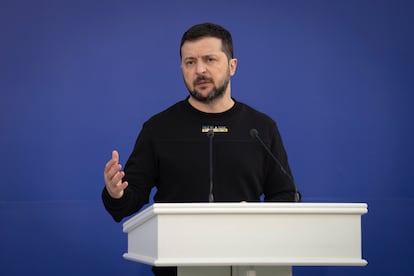Zelensky calls for confiscating Russian Central Bank funds
In an appeal to the heads of the IMF and World Bank, the Ukrainian president said: ‘Russia must feel the full price of its aggression’

In an appeal to the heads of the IMF and World Bank, Ukraine’s president on Wednesday renewed his call to confiscate Russian Central Bank assets held around the world and use them to help rebuild Ukraine. “To charge the aggressor with compensation for damages,” Ukrainian President Volodymyr Zelensky said by video link. “Russia must feel the full price of its aggression.”
The U.S. announced at the start of Russia’s invasion that America and its allies had blocked access to more than $600 billion that Russia held outside its borders. The U.S. and its allies continue to impose rounds of targeted sanctions against companies and the wealthy elite with ties to Russian President Vladimir Putin.
“It must be clearly stated that the assets of the Russian Central Bank will be confiscated. It will be a peacemaking act on a global scale,” Zelensky said.
He was patched in for a session with Ukrainian Prime Minister Denys Shmyhal, U.S. Treasury Secretary Janet Yellen, World Bank President David Malpass and International Monetary Fund Managing Director Kristalina Georgieva, held during the IMF and World Bank spring meetings to discuss Ukraine’s ongoing funding needs.
A joint assessment released in March by Ukraine’s government, the World Bank and European Commission estimates Ukraine’s long-term recovery needs will total at least $411 billion. In March, Ukraine and the International Monetary Fund agreed on a $15.6 billion loan package aimed at shoring up the government’s severely strained finances.
Since the war began in February 2022, the United States has given Ukraine more than $100 billion in military and civilian support, which includes some money for reconstruction. Other countries also have provided Ukraine with substantial support.
At the roundtable, Yellen said “the United States will do what it takes to support Ukraine, for as long as it takes.” She said “our historic multilateral sanctions coalition is restricting Russia’s access to the technology and equipment it needs to supply its military.”
Zelensky argued that liquidating Russia’s funds held around the world, including those of sanctioned oligarchs, would send a message to “potential aggressors” wherever they may be.
The idea is gaining traction. Former Biden administration official Daleep Singh told the Senate Banking Committee on Feb. 28 that forfeiting Russia’s billions in assets held by the U.S. is “something we ought to pursue.” And Charles Michel, president of the European Council, has called for using Russia’s Central Bank funds to “rebuild what it has destroyed.”
The U.S. announced last week that Treasury officials Liz Rosenberg and Brian Nelson — specialists in sanctions and terrorist financing — will travel to Europe this month to meet with leaders of financial institutions in Switzerland, Italy and Germany. They plan to share intelligence on potential sanctions evaders and to warn of the potential penalties for failure to comply with international sanctions.
During Wednesday’s meeting, Zelensky stood and called for a moment of silence for a Ukrainian soldier who appears to have been beheaded. A gruesome video that purports to show the beheading spread quickly online and drew outrage in Ukraine, in the latest accusation of atrocities said to have been committed by Russian troops.
Sign up for our weekly newsletter to get more English-language news coverage from EL PAÍS USA Edition
Tu suscripción se está usando en otro dispositivo
¿Quieres añadir otro usuario a tu suscripción?
Si continúas leyendo en este dispositivo, no se podrá leer en el otro.
FlechaTu suscripción se está usando en otro dispositivo y solo puedes acceder a EL PAÍS desde un dispositivo a la vez.
Si quieres compartir tu cuenta, cambia tu suscripción a la modalidad Premium, así podrás añadir otro usuario. Cada uno accederá con su propia cuenta de email, lo que os permitirá personalizar vuestra experiencia en EL PAÍS.
¿Tienes una suscripción de empresa? Accede aquí para contratar más cuentas.
En el caso de no saber quién está usando tu cuenta, te recomendamos cambiar tu contraseña aquí.
Si decides continuar compartiendo tu cuenta, este mensaje se mostrará en tu dispositivo y en el de la otra persona que está usando tu cuenta de forma indefinida, afectando a tu experiencia de lectura. Puedes consultar aquí los términos y condiciones de la suscripción digital.








































